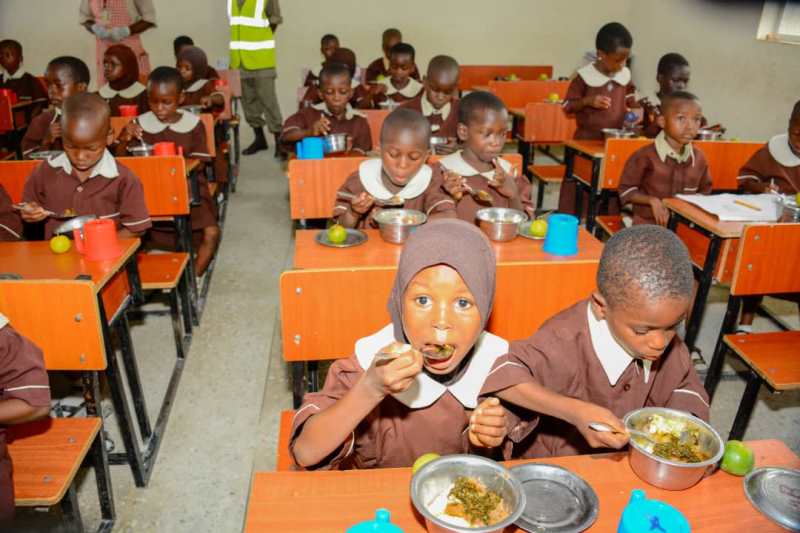A total of 282,529 pupils are currently being fed under the Home Grown School Feeding Programme in Zamfara, Minister of Humanitarian Affairs, Disaster Management and Social Development, Hajiya Sadiya-Umar Faruk, has said.
The minister made the disclosure at a town hall meeting in Gusau on Monday.
She said the scheme was being carried out in 1,759 schools spread across the 14 local government areas of the state.
Faruk added that 2,000 cooks were employed in the state to provide food to the pupils.
On the town hall meeting, the minister explained that it was to identify, articulate and derive solutions to the humanitarian and developmental challenges in the state.
“It must be noted that the COVID-19 lockdown, ongoing activities of armed bandits and the flooding experienced across the North West has led to the displacement of over 247,000 persons across Zamfara, Katsina, Sokoto, Kaduna, Niger and Kebbi.
“This has impacted on the economic and agricultural activities in Zamfara State, thereby, creating social and economic vulnerabilities.
“This Townhall meeting is significant, as it will allow us to collectively communicate, identify, articulate and derive solutions to the humanitarian and developmental challenges that have arisen in Zamfara State from banditry, extreme weather conditions and the COVID – 19 pandemics,” she said.
Faruk commended the commitment of the Zamfara government in addressing the challenges of economic vulnerability and pledged that her ministry will continue to partner with the state to implement humanitarian, social inclusion and protection measures.
According to her, the Federal Government Enterprise and Empowerment Programme (GEEP) programme had provided loans to 48,503 individuals in Zamfara.
She also said that the Conditional Cash Transfer (CCT) scheme has impacted positively on the lives of over 6.44 million vulnerable poor people across the country, including Zamfara.
“Beneficiaries enrolled into the program increased from 630,964 Poor and Vulnerable Households with direct household beneficiaries of 3,201,402 as at August 2019 to 1,289,405 Poor and Vulnerable Households with 6,443,878 direct households beneficiaries as at August 2020.
“Number of beneficiaries receiving payment increased from 469,362 households in 22 states to over one million in 34 states.
“The CCT is providing support to 129,137 poor and vulnerable households in Zamfara with a monthly base cash transfer of N5,000, with the sole aim of graduating them out of poverty,” she said.
Gov. Bello Matawalle, represented by the Secretary to the State Government, Alhaji Bala Maru, appealed to the federal government to fulfil its earlier promise of providing N10 billion to support victims of flood and armed banditry in the state.
Matawalle also appealed to the federal government to reconstruct the Dansadau-Birnin Gwari-Minna federal road, which went through Zamfara, Kaduna and Niger states.
The governor explained that the reconstruction of the road will aid the fight against banditry in the state.
He called for synergy between the state government and Ministry of Humanitarian Affairs, to form a joint team for distribution of support materials to deserving persons.
Also in his remarks, Chairman, Zamfara Council of Chiefs, who is also the Emir of Anka, Alhaji Ahmad Muhammad appealed to the federal government to provide assistance to displaced person and families affected by banditry.
The News Agency of Nigeria (NAN) reports that others who spoke at the town hall meeting called for sustainable measures to tackle poverty and banditry, as well as the challenges in the educational and agricultural sectors.

